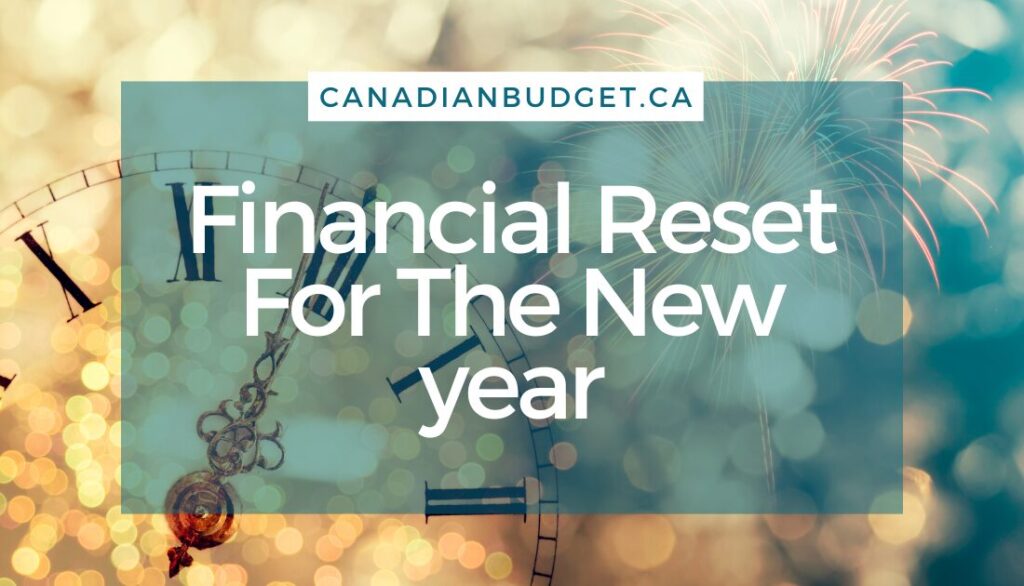How to Do a Financial Reset for the New Year
Table of Contents
Toggle
As the new year begins, it’s the perfect time to take stock of your financial health and set yourself up for success. A financial reset or a new year financial review allows you to reflect on your spending, identify opportunities for improvement, and establish goals that will keep you on track for 2025 and beyond. Here are actionable steps to help you hit reset on your finances and start the year strong.
Review Your 2024 Spending for Insights and Shocks
Start by reviewing your spending habits from the past year. This is easy if you are already a budgeter or track expenses with an app or software. But if not, downloading your bank and credit card statements will help with the process. Check your spending history or statements to identify patterns or surprises. Ask yourself:
Did any bills increase unexpectedly? Did you spend more than anticipated in certain areas, such as dining out, entertainment, or travel?
By pinpointing these insights, you can better understand where your money is going and how to adjust for the future. For example, if utility bills or grocery expenses rose, you might cut costs elsewhere or budget more realistically in those categories.
Check-In on Your Debt Levels
Unfortunately, Canadians have high household debt levels, with the average Canadian debt being $72,950. Take an honest look at your current debt situation. Make a list of all outstanding balances, including credit cards, loans, and lines of credit. Knowing where you stand is the first step toward creating a repayment plan. If you carry a balance, consider prioritizing high-interest debt to save money in the long run. If feasible, commit to paying more than the minimum payment where possible. Once you get those balances paid off, commit to keeping them clear each month!
Do a Fee Inventory and Reduce Costs
Fees can quietly erode your finances over time, so now is the time to assess and reduce them. Here are some areas to review:
Banking fees: Are you paying monthly account fees or ATM charges? Look for no-fee banking options.
Investment fees: Check the expense ratios on your investments. Switching to low-fee ETFs could save you significant money.
Subscription fees: Cancel subscriptions you no longer use or enjoy. Even eliminating one can make a difference over the year.
Phone and Internet charges: Shop around for better deals from providers. If you can save money, don’t hesitate to switch companies. Call your provider and negotiate.
Loyalty to service providers isn’t always worth it. Negotiating or switching could free up extra cash for your financial goals.

Create a New Budget for 2025
A fresh year calls for a fresh budget. Base your 2025 budget on what you’ve learned from last year’s spending habits. Remember that prices for many goods and services, such as groceries and utilities, may have increased. Build some flexibility to account for rising costs, and don’t forget to allocate funds for your savings and debt repayment goals.
Set New Financial Goals
The new year is an excellent opportunity to set or refine your financial goals. These could include:
Building an emergency fund: Aim to save 3-6 months’ expenses.
Cutting one subscription: Reduce recurring costs to redirect funds toward savings or debt repayment.
Learning to invest: Take a course or read books about investing to grow wealth.
Starting to budget: Use budgeting software, a paper based workbook, or spreadsheet to track expenses and stay organized.
Automating savings: Make sticking to your plan as easy as possible. And earn as much as possible with a High Interest Savings Account like Wealthsimple Cash or Neo.
Automating bill payments: Avoid late fees and improve your credit score by automating recurring payments.
Committing to no balance carry: Resolve to pay off your credit card in full each month to avoid interest charges.
Be specific about your goals, and break them into smaller, actionable steps to stay motivated.
Check Your Credit Report
Your credit report is a key component of your financial health. Obtain a free copy of your credit report from TransUnion or Equifax to check for errors or signs of identity theft. Look for:
Inquiries from unknown companies
Address changes you didn’t make
Other suspicious activity
If you find anything unusual, immediately flag your account with the credit bureau and report potential fraud to the Canadian Anti-Fraud Centre.
Check your score for free directly through Equifax or Transunion or by using an easy to use app like Borrowell. You can also monitor your credit with a service like Equifax Complete Friends and Family – a service I have used to monitor my credit since my identity was stolen.
Talk About Money with Family and Friends
Money can be sensitive, but discussing it with trusted family and friends can lead to valuable insights. For example, you might:
Talk to parents about estate planning: Ensure their financial affairs are in order and understand their wishes.
Share budgeting tips with friends: You might learn new strategies or tools to manage your money better.
Set a money date: Have one with yourself, your partner, or friends to discuss finances, challenges, and goals.
Having open conversations about finances with trusted friends and family can help you create a support system to keep you accountable for your goals. And who knows, you may spark the idea in them to conduct their own financial reset.
Final Thoughts on Financial Resets
A financial reset doesn’t have to be overwhelming. By reviewing your spending, reducing fees, setting goals, and planning for the future, you can take control of your finances and set yourself up for a successful 2025. Small, consistent steps can make a big difference, and incremental changes can help you adopt new habits. Start today and watch your financial health improve throughout the year.
About The Author
Jessica Morgan
Jessica Morgan is the founder and CEO of Canadianbudget.ca. She is passionate about personal finance and helping Canadians improve their financial literacy by providing more Canadian focused financial content. A millennial mom of one, she has a burning obsession with all things personal finance.
Jessica has a BA in East Asian Studies from York University and a Masters in Business Administration from Toronto Metropolitan University. She is a career public sector employee with a Hybrid Pension, and an advocate for Canadian women to improve their personal finance knowledge.


